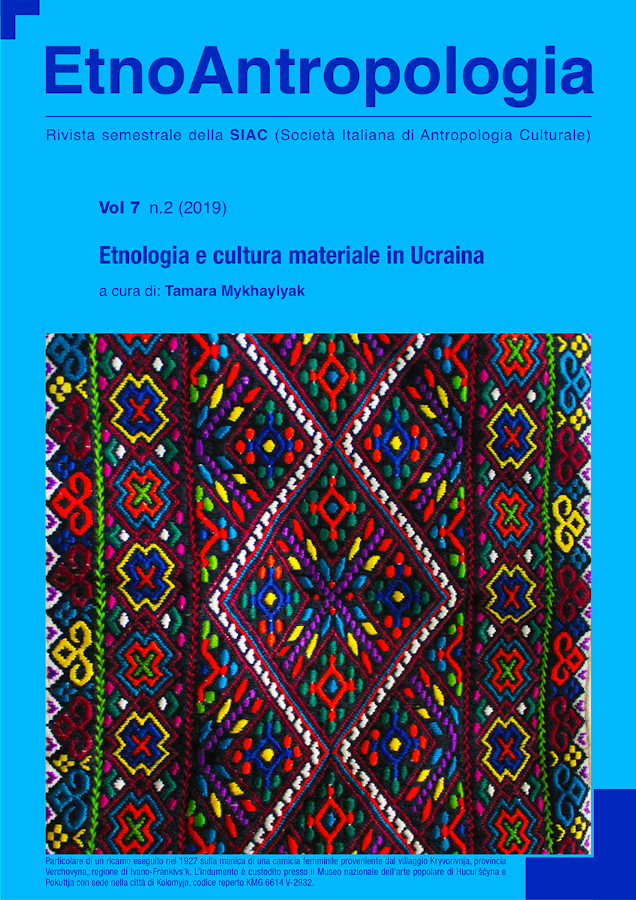The Ritual Aspects of Ukrainian Beekeeping
Parole chiave:
Beekeeping, ritual, Ukrainian, apiculture, folk calendar.Abstract
The article deals to research of Ukrainian ritual context of apiculture. The complex research of symbolic and semantic aspects of Ukrainian apiculture is based on separation of three fundamental ritual “units”: folk Ukrainian vision of a bee along with an insect’s status in a worldview tradition, historical process of developing the institute of patronage and defining the role of patron saints in Ukrainian apiculture; its place in a system of traditional national ritualism and, in particular, outlining the general portrait of an apiarist against the background of the past, as well as ambivalence of his character, narrative and conceptual accentuation and integral conceptualization of apiarian motives of the folk calendar (ritual activities of spring-summer and autumn-winter cycles); role of apicultural products in the Ukrainians’ ritual life (worldview visions, calendar and occasional ritualism, rituals of human life cycle, magic ritual practice). The comparative ethnological analysis of apiarian ritualism of the Ukrainians has found both local feature of separate visions and beliefs and all-Ukrainian worldview matrix of apiarian spiritual phenomenon. While comparing the data, of field and literary sources, on the ritual aspects of traditional apiculture of the residents of Ukraine and some Slavonic (and, in the broader sense – European) countries, we detect a considerable range of common features.Riferimenti bibliografici
Archive of the Ethnology Institute of National Academy of Sciences of Ukraine.
Baiher Y. 1899, Terebovlia district. Geographical-historical and ethnographic sketch, Lviv.
Beekeeping prejudices and experience in Korosnian region, 1961, «Nasze Slovo» («Our Word»), 49: 5.
Bukovyna dialects: chrestomathy of dialect texts, 2006, Chernivtsi: Ruta.
Bystron J. 1917, Studios of folk customs, «Works of the Academy of Arts», 35: 1-39.
van Hennep A. 1999, Rites of transition. Systematic study of rites. Моscow: Orient Literature.
Ethnographic profile of the Slobozhanshchyna region by archival materials, 2017, «Folk creation and ethnology», 4: 96-107.
Ivanova Yu. 1973, Greeks, in Calendar customs and rites in the countries of foreign Europe, Moscow: Science, 308-329.
Koval O., Koval T. 2011, Novovodolazski holosnyky-2, Charkiv: Brovin.
Lévi-Strauss C. 1966, Mythologiques: du miel aux cendres. Paris: Editions Plon.
Movna U. 2017, Beekeeping: Ukrainian ritual contex, Lviv.
Movna U. 2006, Customs and rituals of Ukrainian beekeepers of Carpathians and Subcarpathia, Lviv.
Movna U. 2011, Production and spiritual heritage of traditional beekeeping of Korsun-Shevchenkivskyi and Kaniv districts of Cherkasy region, Lviv.
Myloradovych V. 1897, Folk rituals and songs of Lubny district of Poltava province, recorded in 1888-1895, «Collection of Kharkiv Historical-Philological Society», 16: 1-223.
Nikolskyi N. 1929, Pre-Christian beliefs and cults of Dnieper Slavonic, Moscow: Ateist.
Podolskyi V. 1882, Apiarists’ legends, «Works of the Free Economic Society», 1 (2): 195-197.
Tolstaia S. 2005, Polissia Folk Calendar, Moscow: Indrik.
Wolfe 2008, Anthropology: history, culture, philosophy, S. Petersburg: Publishers of S. Petersburg University.
##submission.downloads##
Pubblicato
Come citare
Fascicolo
Sezione
Licenza
Copyright (c) 2020 Uliana Movna

TQuesto lavoro è fornito con la licenza Creative Commons Attribuzione 4.0 Internazionale.
Gli autori mantengono i diritti sulla loro opera e cedono alla rivista il diritto di prima pubblicazione dell'opera, contemporaneamente licenziata sotto una Licenza Creative Commons - Attribuzione che permette ad altri di condividere l'opera indicando la paternità intellettuale e la prima pubblicazione su questa rivista.
Gli autori possono diffondere la loro opera online (es. in repository istituzionali o nel loro sito web) prima e durante il processo di submission, poiché può portare a scambi produttivi e aumentare le citazioni dell'opera pubblicata (Vedi The Effect of Open Access).





